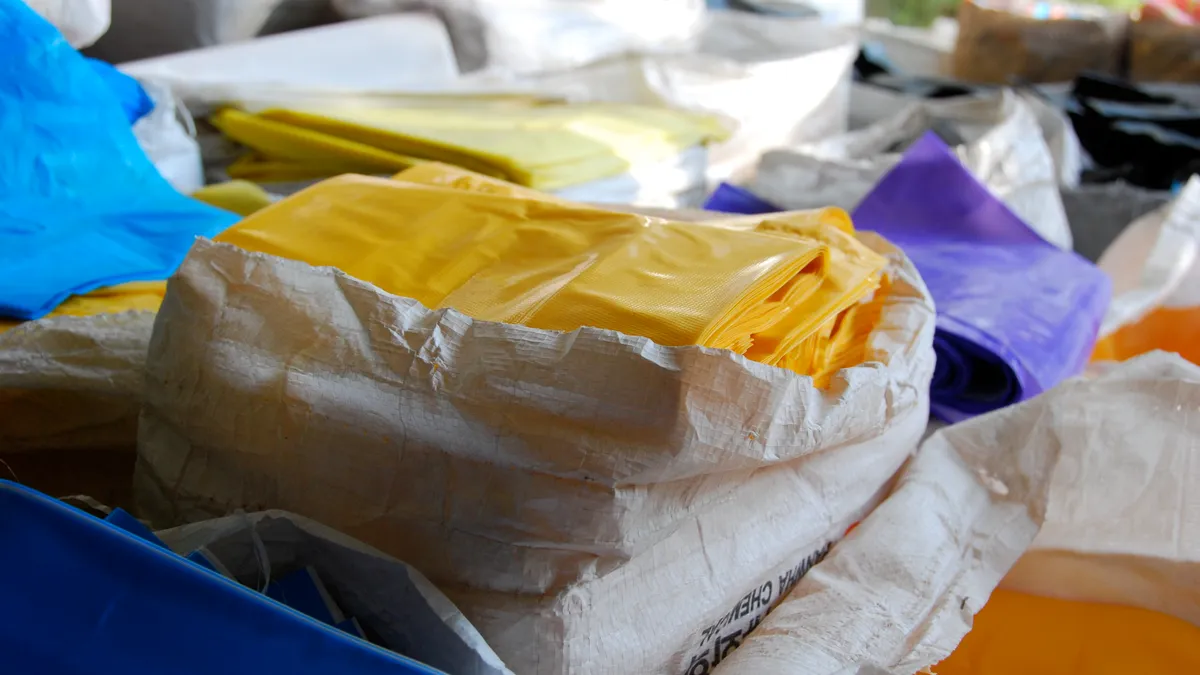Dive Brief:
- U.S. plastic bag manufacturers are rebranding and rolling out new sustainability commitments amid rising anti-plastics sentiment in many states. The American Progressive Bag Alliance has renamed itself the American Recyclable Plastic Bag Alliance (ARPBA). The group is aiming for a 95% reuse or recycling rate for plastic bags by 2025.
- ARPBA is working toward 10% recycled content by 2021, increasing to 15% by 2023 and 20% by 2025. The targets closely resemble the suggestions proposed in 2019 by the Recycle More Bags coalition, which focused on plastic bags as part of a circular economy and wanted Canadian governments to adopt new standards.
- Matt Seaholm, ARPBA executive director, told Waste Dive there may be struggles to source post-consumer recycled (PCR) material, but also indicated some hope that an increase in recycled content might see exemptions from regulations. "It's a much better approach than just simply banning it," he said.
Dive Insight:
Legislation targeting plastics, particularly items like single-use bags and straws, has been gaining momentum for several years on a state and local level. There is some interest in Congress as well, sparking concern from the plastics industry, as well as from some waste and recycling groups.
Plastics companies and their trade organizations argue their products were never intended to be single-use and that a lack of education around recycling has clouded public opinion. ARPBA's name change is not meant to signal a pivot, but instead to emphasize that plastic bags can be recycled, Seaholm said.
"The most important part of this is the educational component," he said.
Current plastic bag reuse rates are at around 78%, according to ARPBA, while recycling rates are around 12%. Many curbside recycling programs do not include plastic bags and the items are notorious for bringing MRF operations to a halt due to tangling. Seaholm pointed to other options, noting that several ARPBA members offer takeback programs for recycling plastic bags, including the Houston-based Superbag.
But plastic bags remain under fire from environmental groups and the public as issues like marine pollution grow more contentious. California banned single-use carryout bags in 2016, while all counties in Hawaii have done the same. New York, Connecticut, Delaware, Vermont, Oregon and Connecticut also implemented regulations last year. Several major cities, including New York, Boston and Denver, also have policies in place.
Faced with scrutiny from lawmakers, plastics groups have sought to emphasize the reusability and recyclability of their products, something underscored by ARPBA's new announcement. It is unclear if increased percentages of recycled content might sway officials, but Seaholm expressed optimism.
"We've certainly had discussions with a variety of elected officials on the idea of recycled content," he said. "Will it end up being something that ends up being exempted? I think that would be great."
But anti-plastics groups remain skeptical. "The targets are weak and not reflective of the serious problems associated with plastic bag pollution. The rebranding reminds me of what cigarette companies used to try," said Judith Enck, former U.S. EPA regional administrator and founder of Beyond Plastics, in a statement to Waste Dive.
And plastic bag manufacturers are also likely to encounter a hurdle currently facing plastic bottle companies. Major beverage makers like Coca-Cola and Nestlé are struggling to meet their PCR goals amid a lack of material in the supply chain due to low recycling numbers. ARPBA's new goals do not require PCR, as post-industrial recycled material is also acceptable, but its members could still face challenges.
"I think there is a concern about the availability of PCR resin, especially the high-quality stuff," Seaholm said, nodding to struggles in California, which mandates 40% PCR for plastic bags. While he called the situation "a little bit tough," Seaholm argued the problem could be countered by strengthening end markets and building up demand.
Nestlé Waters North America recently backed an amendment to a PCR beverage container bill in Maine, part of an effort to bolster available material. It is unclear whether the manufacturers behind ARPBA might take similar steps as they seek to meet their own goals.














